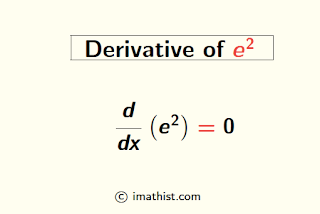The derivative of e square is zero. Note that e square is denoted by e2. In this post, we will learn how to find the derivative of e2, that is, how to differentiate e square.
Derivative of e2 Formula
The formula for the derivative of e2 is 0. This formula is written below.
$\dfrac{d}{dx}(e^2)=0$ or $(e^2)’=0$.
Here, the prime $’$ denotes the first-order derivative.
What is the Derivative of e2?
Answer: The derivative of e2 is 0.
Explanation:
We know that the value of $e$ is given by the following convergent series:
$e=\sum_{n=0}^\infty$ $=1+\dfrac{1}{1!}+\dfrac{1}{2!}+\cdots$
The number $e$ is irrational, and its value is approximately equal to 2.7182818 (up to $7$ decimal places). As $e$ is a fixed number, we conclude that $e$ is a constant.
This implies that $e^2$ is a constant with respect to $x$.
$\therefore \dfrac{d}{dx}(e^2)=0$ by the rule Derivative of a constant is 0.
Thus, the derivative of e2 is equal to 0.
Also Read:
Derivative of e2 by First Principle
Let f(x)=e2. See that e2 is independent of x, so we have f(x+h)=e2 for any values of x and h. By the first principle, the derivative of f(x) is equal to
$\dfrac{d}{dx}(f(x))$ $=\lim\limits_{h \to 0} \dfrac{f(x+h)-f(x)}{h}$
So $\dfrac{d}{dx}(e^2)$ $=\lim\limits_{h \to 0} \dfrac{e^2-e^2}{h}$
$=\lim\limits_{h \to 0} \dfrac{0}{h}$
$=\lim\limits_{h \to 0} 0$
= 0.
Thus, the derivative of e2 by the limit definition is equal to 0.
Also Read:
FAQs
Q1: What is the derivative of e2?
Answer: The derivative of e^2 is zero.
